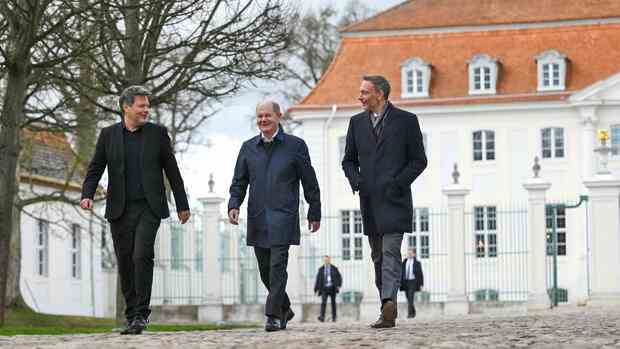Meseberg FDP leader Christian Lindner remains tough in the dispute over the EU-wide end for cars with internal combustion engines: The liberals would only give in to the debate about internal combustion engines if there was legal certainty that cars after 2035 could also be operated with e-fuels.
“Following the decision of the European Parliament and the subsequent debate, there is currently no legal certainty that vehicles with petrol and diesel engines can actually be registered after 2035 if they are fueled with eco-fuel,” said the finance minister on Monday End of the cabinet meeting of the traffic light government in Meseberg. Exactly this constitutional clarity for technology openness is needed.
Chancellor Olaf Scholz said that the federal government agreed that the EU Commission would make a proposal on how e-fuels can be used after 2035. Federal Transport Minister Volker Wissing had previously shown himself optimistic that a solution would be found in the dispute over a planned EU exit for cars with internal combustion engines.
“We are on the right track,” said the FDP politician in Meseberg. He agreed with EU Commission President Ursula von der Leyen during the talks on Sunday that the climate protection goals had to be achieved.
The issue now is how openness to technology can be integrated into the Commission’s proposals. This is not an issue that needs to be decided within a week, he said, referring to the EU-level vote that was postponed last week.
Von der Leyen insists on a quick agreement in Meseberg
The background is the resistance within the coalition of the FDP to accept an end to combustion engines from 2035 at EU level. The final vote among the 27 EU governments was postponed because Germany would not have agreed.
According to Wissing, the proposal promised by the EU Commission on how climate-friendly fuels – so-called e-fuels – could be used in combustion engines after 2035 and not just in small quantities is still missing. Von der Leyen insisted on a quick agreement as a guest at the cabinet meeting in Meseberg on Sunday.
>> Read here: Von der Leyen: Constructive dialogue on combustion engine off
In view of numerous controversial issues in the traffic light coalition, Scholz, Lindner and Economics Minister Robert Habeck (Greens) emphasized the constructive talks in Meseberg. There was agreement that this spirit should be transferred to day-to-day business, said the Chancellor, without giving any details.
Finance Minister Lindner said with regard to basic child security that this will only take effect in 2025. Therefore there is no connection to the budget negotiations for 2024. The volume of two to three billion euros for basic child security is financially feasible. The SPD and the Greens had feared that, given the current budget debates, there might not be enough money available for basic child security.
Economics Minister Habeck also announced that he would quickly implement a concept for an industrial electricity price in Germany. It is a competitive disadvantage that in Europe, unlike in the USA, the operating costs of production are not subsidized, said the Green politician.
Chancellor Scholz expects low unemployment
Habeck named costs of five to nine cents for renewable energies, which should reach the companies “in full”, for example through direct contracts. “That would be part of an industrial electricity price out of the market,” he said. It will be checked whether additional measures are necessary for the companies until a sufficient amount of green electricity is available.
Chancellor Scholz assumes that unemployment will no longer be an issue in Germany in a few years. “In the next few years, Germany will leave the problem of unemployment behind,” said the SPD politician with a view to the upcoming restructuring of industry to make it more climate-friendly.
“There is a lot to do for which we need a lot of women and men who work here in Germany, but also come from other countries, so that all the work that is now required in Germany can be done.” The unemployment rate is currently still low at 5.7 percent.
>> Read here: Despite disputes, Scholz draws a positive interim conclusion from the coalition
At the same time, Scholz called for more speed to make the industry climate-neutral by 2045. “By 2030, we need to put up four to five new wind turbines a day and the equivalent of more than 40 football pitches full of solar panels a day,” he said.
Economics Minister Habeck also spoke of a “gigantic industrial and employment program that we are pushing forward here”. The aim is to create a climate-neutral economy and society. Then there should be a balance in Germany between the emissions of greenhouse gases and the absorption of these gases from the atmosphere.
Finance Minister Christian Lindner said that his house, together with the Ministry of Justice, will present a draft for a future financing law this week. “We want to go to the departmental vote very quickly,” said the FDP leader. Because for the restructuring of the economy, large sums of private capital are needed.
Scholz again emphasized that the prerequisites for the success of this restructuring of the economy are confidence and the feeling that people will benefit from it. “This cycle of mutual disappointment of expectations must be broken,” said Habeck. Municipalities, federal, state and private individuals pull together.
More: Scholz repeatedly takes Lindner’s side – to the annoyance of the Greens
